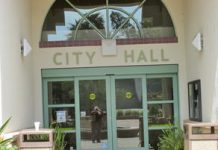What comes next?
While many residents are perhaps grateful that the disruptive chaos of the recent election is over, perhaps we should be more concerned about what comes next? For too many citizens, elections are a one-day ordeal, having to pick candidates and taking the time to exercise their civic duty by voting.
Aside from learning the personality conflicts of candidates, there is much to be gained from the process by listening intently. If voters paid attention to the candidates, there were many seedlings of ideas that could, if nurtured properly, grow into effective community solutions.
Whomever emerges as victorious during this campaign has every reason and responsibility to take into account every workable idea generated by the candidates.
As evidenced from the debate and discussions throughout the campaign (as cited by longtime islanders), the problems discussed in 2018 were not radically different than those discussed in 2014. The issues in 2014 not so much different than those 2010, etc., etc.
To be sure, the city of Avalon is in a unique position; and a rather precarious one at that. They are entrusted with the public interest of the community, yet they must operate in a world where almost everything in the city is owned by a private sector company, the Santa Catalina Island Company.
To be fair, the Island Company, in a sense, came first. For more than a century, they been charged with a business model of creating a community around which the natural beauty of the island could both be preserved and shared with the public. Businesses, meanwhile, must be sufficiently administered to allow for the prosperity of its owners while creating value for visitors to the island and adhering to the mission.
Therefore, the relationship between the city and Island Company is perhaps the most unique public/private partnership in the world. Nevertheless, it is a strategic partnership upon which thousands of people depend for their quality of life.
It is in this competing co-existence the inherent tension of this relationship causes much passion and fury, as evidenced in many ways during the election.
It is against this backdrop, every four years, that these “elections” serve to rebalances the civic power of a community. Moreover, these campaigns by private citizens seeking to serve their community should be considered a unique opportunity to harvest for new ideas and proposed solutions. Catalina has hope that the incoming administration will choose to selflessly pursue whichever of these solutions best promotes the public interest.
Although the campaign endured some awkward moments, many workable policy ideas were expressed by the candidates. Moreover, there were even hints and a glimmer of hope that the Island Company and city could perhaps come together for a fresh start; recognizing the value they both bring to the table, despite their divergent constituencies, yet equally critical missions.
If they can, the issues in the 2020 campaign could be much different, with substantial progress to report. If not, sad to say, the issues will be same, only recycled once again.
Workable solutions emerged from this campaign. What Catalina needs now is the will to collaborate, then act. Hopefully, this will be what comes next.
David N. Young is editor of the Catalina Islander. He may be reached at editor@thecatalinaislander.com.











